OTTAWA — The federal Liberals faced calls Wednesday to take a national approach to decriminalization amid the mounting death toll of the opioid crisis, even as the House of Commons voted against an NDP bill to allow drugs for personal use countrywide.
After the rejection of the bill was announced, someone in the chamber could be heard crying out, “Shame on you!”
Next year, British Columbia will join a handful of jurisdictions around the world where drug users will not face charges for possessing small amounts of some illicit drugs for personal use.
“There isn’t at this stage any larger discussion on decriminalization,” federal Justice Minister David Lametti told reporters in Ottawa on Wednesday, noting that the issue falls under the health portfolio, not justice.
Asked in French whether Ottawa should take a pan-Canadian approach rather than considering individual jurisdictions’ requests, Lametti said that is something that should be studied, but the government is not doing so now.
Prime Minister Justin Trudeau appeared to leave the door open a little on Wednesday, saying the federal government will not pursue decriminalization with other jurisdictions without putting “the system and supports in place.”
Trudeau said the government took this approach with B.C. by building capacity and offering many ways to support people, such as projects offering a safe supply of illicit drugs.
Carolyn Bennett, minister of mental health and addictions, left the door wider still.
She said the government will watch how decriminalization unfolds in B.C. to see if it achieves its intended goals for “both public safety and public health.”
NDP MP Gord Johns said Wednesday that the federal government had an opportunity to pass his private member’s bill, which would amend the Controlled Drugs and Substances Act to decriminalize personal drug possession across Canada.
Johns, who is the party’s critic for mental health and addictions, said the toxicity of the drug supply is claiming Canadian lives.
“I hope they’ll do the right thing,” said Johns ahead of the vote.
“Otherwise they are going to have blood on their hands.”
The Bloc Québécois, Greens and a handful of Liberal MPs ultimately joined the NDP in voting in favour of the bill, but it was defeated 71-248 with the Conservatives and most Liberals voting against.
Bennett said that once B.C.’s plan has rolled out, and the results can be assessed, the federal government will be able to respond to any “unintended consequences.”
“I think all the other jurisdictions will be interested in learning from the B.C. experience,” said Bennett.
Not every province was jumping at the chance.
Alberta Premier Jason Kenney said Tuesday he has concerns about the federal government’s decision to decriminalize possession of small amounts of illegal drugs in B.C.
The Manitoba government also said Tuesday it will not follow B.C.’s example.
Quebec Premier François Legault said Wednesday the province has no plans to pursue decriminalization, adding the government does not think it is necessary.
On Wednesday, Saskatchewan’s government said it was not considering any decision to criminally exempt substances like methamphetamine and cocaine.
“It is unknown what potential long-term effects that decriminalizing illicit drugs will have with regards to public safety. Our government is focused on ensuring that treatment services are available to help people with substance abuse issues to access recovery,” it said in a statement.
New Brunswick Health Minister Dorothy Shephard said she was interested to hear what B.C. has done but it was too early to comment. Her province has been working to help people affected by the drug crisis rather than criminalize them, she said.
On the campaign trail in Ontario, the New Democrats said they would work with Ottawa on decriminalizing drugs for personal use if elected, but the Liberals aren’t considering a similar move. The Progressive Conservatives did not immediately respond to requests for comment.
Separately, the City of Toronto has asked Ottawa to allow it to decriminalize possession of small amounts of drugs.
Bennett said there has also been some interest from Montreal, Edmonton and Saskatoon, but they have not submitted proposals seeking decriminalization.
Trudeau has said in years past that the federal government would not pursue decriminalization as an option for tackling the toxic drug and opioid overdose crisis.
Conservative MP Brad Vis, who represents the B.C. riding of Mission-Matsqui-Fraser Canyon, said he doesn’t think decriminalization will fix the crisis in the province without also improving access to addiction treatments and mental health supports.
B.C.’s three-year exemption from federal drug laws means people with small amounts of illicit drugs for personal use will not have their drugs seized by police.
Vis said the province already had “de facto decriminalization,” in which most police officers didn’t arrest people for simple possession, nor did the Crown lay charges against those individuals.
As a crisis of opioid-related overdoses and deaths rages on in Canada, advocates have long been saying that decriminalization would help to reduce stigma associated with drug use and help save lives.
Since January 2016, almost 27,000 Canadians have died from opioid-related causes, according to the Public Health Agency of Canada.
This report by The Canadian Press was first published June 1, 2022.
—
This story was produced with the financial assistance of the Meta and Canadian Press News Fellowship.
— With files from Mickey Djuric in Regina and Kevin Bissett in Fredericton
Erika Ibrahim, The Canadian Press
